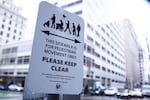The Salem City Council Monday will consider an ordinance that would ban people from sitting or lying on public sidewalks from 7 a.m. until 9 p.m.
The ordinance would also place a 24-hour restriction on camping and leaving personal property unattended on any public sidewalk in the city.
If passed, the ordinance would allow police to issue warnings. If there are repeat offenders, law enforcement would also be able to give people exclusion orders in the city’s “Downtown Crime Prevention District” — effectively banning offenders from downtown and north Salem.
Those with exclusion orders could get citations for trespassing if in those exclusion zones, which could lead to a jail sentence.
Salem City Council reviewed a similar ordinance in 2017 but did not end up passing it — instead the Council directed a task force to study solutions for homelessness in downtown and north Salem. The city is still in the process of implementing recommendations from that task force, including things like providing public restroom facilities.
“While we have moved forward with those implementation items, the city, and the urban development department, the police department continued to receive concerns raised by the business community and property owners in downtown about impacts to their businesses — safety concerns, trash, human waste,” Kristin Retherford, Salem’s urban development director said at a Council work session last week.
“We’ve reconvened to look at this ordinance again because these issues were continuing to happen and increasing.”
Sidewalk restrictions in the state have historically faced legal issues. In 2009, Multnomah County Circuit Court and the U.S. District Court in Oregon ruled a similar Portland “sit-lie” ordinance was unconstitutional. Another Oregon Court of Appeals case from 2005 ruled similarly on another earlier Portland ordinance.

Portland erected signs telling people not to sit or lie on certain sidewalks downtown, which was largely seen as targeting people experiencing homelessness.
Ericka Cruz Guevarra / OPB
Legal advocates in Salem say if passed, this ordinance could face the same fate — specifically due to the portion related to sitting or lying on a sidewalk.
“The sit-lie portion is where I think they get into real constitutional trouble,” said Patricia Stoneroad, an alumna from Willamette University’s School of Law.
Stoneroad is part of a group of advocates doing pro bono legal work, but not actively practicing law.
The group submitted a letter to the City Council and mayor questioning the legality of the ordinance.
According to past cases, Stoneroad said, people can only be cited for sitting or lying on a public sidewalk if they are doing so with an intent to obstruct, not only for sitting or lying.
Related: People Arm Themselves As Tensions Rise Over Homeless RVs At Washington's Capitol
Salem’s city attorney Dan Atchison acknowledges these past court cases but said the city’s ordinance would not be affected by them.
In a statement to OPB, he said those past cases “were decided based on the fact that the local laws at issue were criminal laws. The proposed ordinance is a civil law, not a criminal law, and therefore is not preempted by state criminal laws.”
Stoneroad said that argument doesn’t check out, specifically with the exclusion orders law enforcement can give people which could lead to trespassing charges.
“Although they keep saying that there’s no jail, that this criminal statute doesn’t apply — with a violation considered to be trespass, you can be incarcerated,” Stoneroad said.
“As far as to how this law is carried out, it's very likely going to bring up other concerns like fundamental right to travel and equal protection,” said Devin McEnry, an advocate working with Stoneroad. “It’s pretty apparent from where the exclusion zones are and what they’re trying to do is that they’re trying to target a specific population — the homeless population.”
“There’s no way this law is going to be applied equally,” he said.
The Salem City Council is slated to discuss and vote on the ordinance at its Monday evening meeting.

